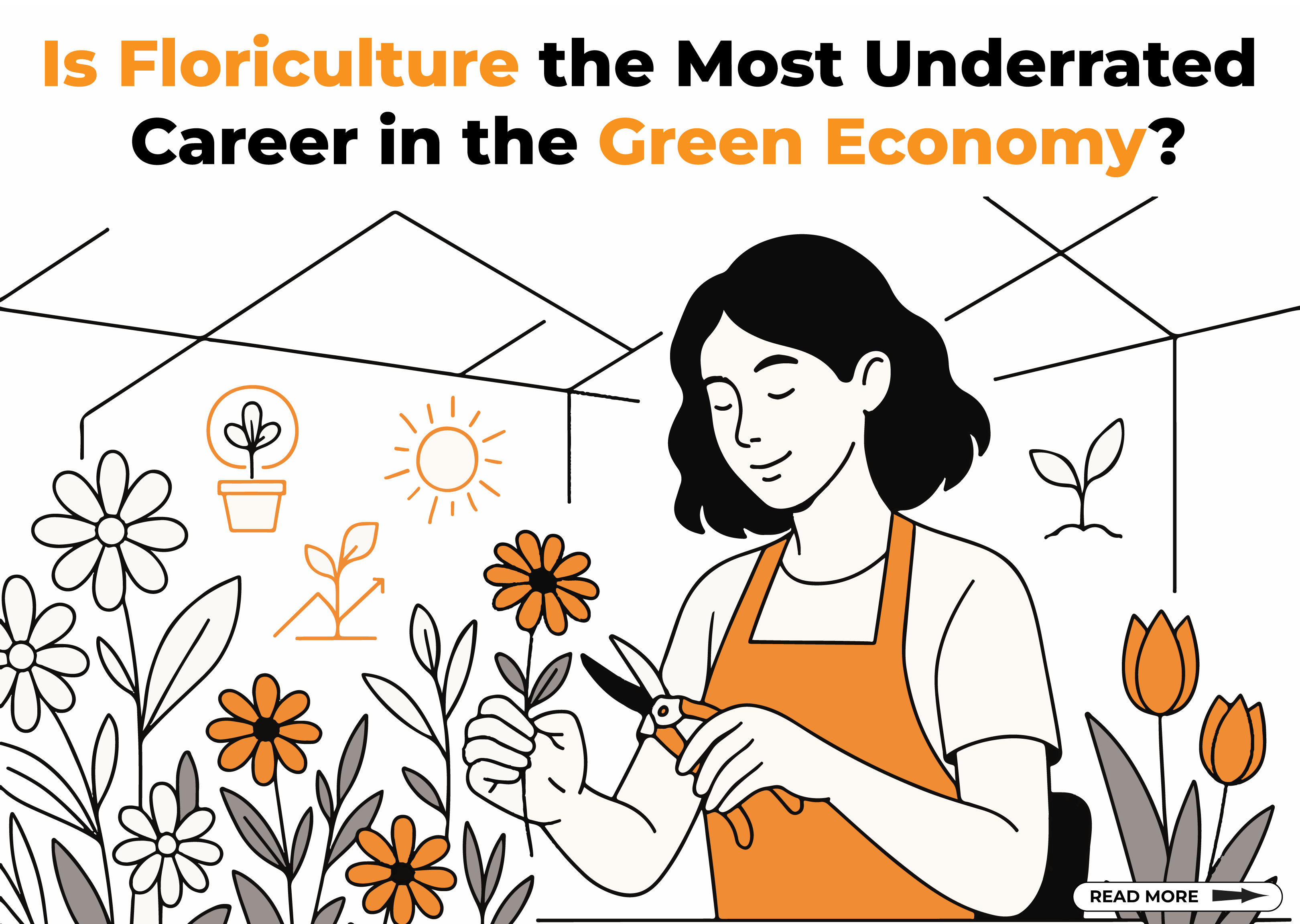Are Flowers Just for Bouquets-or the Future of the Green Economy?
As the world embraces sustainability, one vibrant industry is growing quietly: “Floriculture”. What once stood for beauty and celebration now stands for climate action, innovation, and rural empowerment.
From eco-luxury to carbon-smart cities, flowers are changing the way we think about agriculture and careers. But can floriculture also offer a future-ready profession? The answer is yes, more than ever before.
Why the World Suddenly Cares About Flowers?
Today, flowers influence more than home decor or weddings. They’ve entered everyday life. Think about that lavender body mist, the floral herbal tea in your kitchen, or the marigold garlands used in rituals and festivals. All of these reflect a growing global appreciation for floriculture products such as organic, local, and often handmade.
Clean Beauty and Wellness
Botanicals like rose, jasmine, and chamomile are key ingredients in skincare, spa treatments, and aromatherapy. The shift toward plant-based wellness has pushed flower cultivation into a new spotlight, especially for the extraction of essential oils and use in floral-based products.
Urban Planning and Eco Landscaping
Cities are adding flower belts, vertical gardens, and rooftop meadows. These are not just beautiful, but they reduce carbon levels, cool city temperatures, and improve mental well-being. Floriculture and landscaping are now part of sustainable urban planning.
The Growth of the Floriculture Industry in India
The floriculture industry in India has evolved in silence. States like Karnataka, Tamil Nadu, West Bengal, and Maharashtra are leading the charge. India now exports plant species like marigolds, roses, orchids, and tuberoses to Europe, Southeast Asia, and the Middle East.
Global Demand Is Rising
Across the globe:
- Organic cultivation practices are gaining traction.
- Floral exports are now valued in billions of dollars.
- Wedding and event flower arrangements are now eco-conscious and biodegradable.
- Flowers are no longer seasonal luxuries. They are year-round essentials both emotionally and economically.
Can You Build a Career Around Floriculture Today?
Yes, and the scope is only expanding. From hands-on farming to business innovation, floriculture as a career offers a wide spectrum of floriculture business opportunities for those ready to explore creative, sustainable ventures.
The Scope of Floriculture in 2025 and Beyond
M.Sc. Floriculture and Landscaping now blends science, sustainable agricultural practices, and design. Careers in this field are modern, lucrative, and global. Students with a passion for nature and creativity can explore options that go far beyond traditional flower cultivation.
Career Paths in Floriculture
Here are just a few areas where you can build your future:
- Sustainable Flower Farming: Grow flowers using organic, water-saving, and chemical-free methods.
- Landscape Design: Work with city planners, architects, or developers to create floral environments in public or private spaces.
- Floral Entrepreneurship: Launch a business in flower arrangements, boutique gifting, decor services, or floral therapy.
- Botanical Consultancy: Provide expertise to industries in hospitality, healthcare, or urban development.
- Event Floral Design: Curate sustainable flower arrangements for weddings, corporate functions, and festivals.
Green Business Models Are Changing Everything
Modern customers want ethical, eco-friendly products. This shift impacts how the floriculture industry functions:
- More demand for native and high quality seasonal flowers.
- Preference for biodegradable packaging.
- Rise of zero-waste bouquet brands.
- Direct farm-to-home floral delivery.
A career in floriculture now blends environmental responsibility with creative entrepreneurship.
The Real-World Impact: From Green Jobs to Rural Empowerment
Job Creation in Rural and Semi-Urban India
Floriculture creates jobs at every step by growing, harvesting, processing, packaging, logistics, and sales. It helps smallholder farmers diversify income while working with shorter crop cycles.
- Flower crops can be harvested in less than 100 days.
- They fetch higher prices per square metre than cereals or vegetables.
- Farmers get better returns with less land usage.
Women-Led Cooperatives Are Leading the Way
In states like Tamil Nadu and Uttarakhand, women-led flower cooperatives are thriving. These groups grow flowers, process them, and market them as a community. They’re building financial independence and boosting small scale rural employment.
Some startups even focus on:
- Dried flower crafts
- Organic flower teas
- Edible petals for luxury desserts
- Floral skincare products
How Floriculture Supports Urban Goals?
Urban gardens, flower cultivation, and landscaping projects offer real solutions for pollution, urban heat, and biodiversity loss. Flower corridors in public parks attract pollinators. Rooftop gardens lower building temperatures and energy bills.
Floriculture is connecting urban planning with nature. It’s not just aesthetic, it’s functional and part of long-term ecological strategies.
How Is Innovation Reimagining the Flower Business?
Smart Greenhouses and Tech-Driven Farming
Growing flowers is becoming more intelligent because of greenhouse management. Controlled environments improve crop yield and protect against weather changes.
Farmers now use:
- AI sensors for temperature and humidity
- Soil health tracking systems
- Automated irrigation tools
- Drones for pest detection
Tech doesn’t replace farmers. It empowers them to optimise their production system.
Rise of Vertical Flower Farms
Land is limited, especially in cities. Vertical farms stack flower beds in controlled, indoor spaces. Using LED light, hydroponics, and climate controls, these farms:
- Produce year-round harvests
- Use 70% less water
- Eliminate pesticide usage
Branding Blooms in Fashion, Wellness, and Tech
Flowers now influence global trends.
- Fashion: Sustainable designers use floral dyes and natural motifs.
- Wellness: Rose and hibiscus-infused products are booming.
- Technology: Smart diffusers and floral-scented tech accessories are on the rise.
A career in floriculture can now lead to creative industries you’d never expect.
Is Floriculture the Unexpected Hero of Sustainable Agriculture?
Flowers are helping agriculture go green. The importance of floriculture lies not just in profits, but in purpose.
Environmental Benefits of Flower Farming
- Water Efficiency: Flowers like zinnia and cosmos thrive with minimal water
- Soil Restoration: Intercropping with ornamental crops improves soil fertility
- Pollinator Support: Flowers attract bees and butterflies, key to food production
- Biodiversity: Fields with mixed plant species invite beneficial insects and birds
Managing Waste and Carbon Footprint
Smart management practices are reducing waste in flower cultivation:
- Using recycled paper for bouquet wraps.
- Composting unused petals.
- Offering zero-waste floral decor packages.
The goal is to blend sustainable agriculture with beauty and business.
Why Choose Floriculture at Lovely Professional University (LPU)?
At LPU, students are encouraged to explore the full spectrum of the floriculture industry from eco farming to entrepreneurial leadership.
What makes LPU’s Programme Unique?
- Hands-on Training: Learn in real-world floral labs, vertical farms, and smart greenhouses under varied environmental conditions
- Industry-Ready Curriculum: Stay updated with trends in planting material, botanical entrepreneurship, and climate-resilient farming
- Global Exposure: Connect with export partners, florists, designers, and tech innovators
- Startup Support: Launch your flower-based business with guidance from LPU’s incubators
- Women Empowerment Focus: Programmes promote inclusion and leadership for young women in agri-business
Conclusion
Floriculture is no longer just about beauty. It’s about business, innovation, and environmental impact. As the world leans into green solutions, this vibrant industry offers real career paths that blend creativity with purpose. Whether it’s eco-friendly flower cultivation, floral arrangements, or sustainable agricultural practices, a career in floriculture opens doors to both local impact and global opportunity.
At Lovely Professional University, students explore the full value chain from planting material to branded businesses. They gain the skills to lead in smart farming, flower cultivation, and urban landscaping. If you’re looking for a green career that combines nature, innovation, and social impact, floriculture might be your perfect fit.




![Career Paths After B.Sc. Information Technology [Lateral Entry] Career Paths after B.Sc. Information Technology [Lateral Entry]](https://www.lpu.in/blog/wp-content/uploads/2026/01/Career-Paths-after-B.Sc_.-Information-Technology-Lateral-Entry-218x150.png)



![Why B Sc Information Technology [2+2 with international credit transfer option] at LPU Stands Out? Why B Sc Information Technology [2+2 with international credit transfer option] at LPU Stands Out](https://www.lpu.in/blog/wp-content/uploads/2025/11/Why-B-Sc-Information-Technology-22-with-international-credit-transfer-option-at-LPU-Stands-Out-100x70.png)





